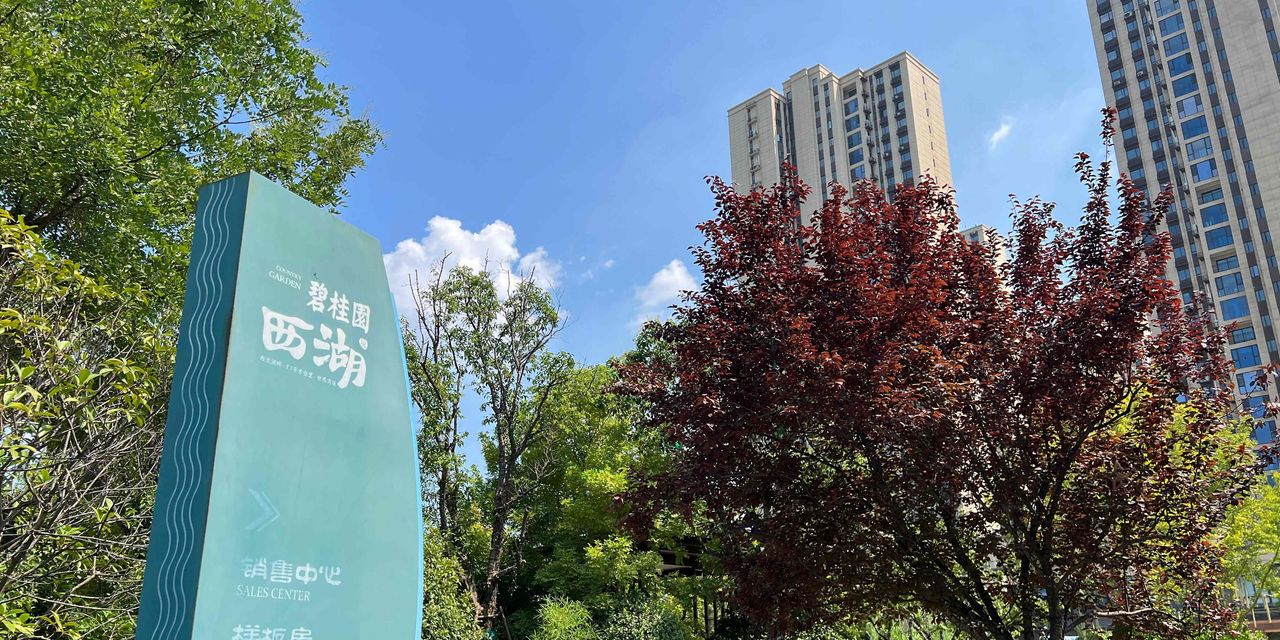““We see more signals that Country Garden’s worsening liquiditymay lead to a higher chance of default in the near term. Thismay further deteriorate the company’s asset value andoperations, and take years to recover from.””
A grim assessment of Country Garden Holdings Co. Ltd. from Morgan Stanley added to pressure on the troubled Chinese property developer on Monday as concerns mounted about the wider sector.
Country Garden’s
2007,
stock tumbled 18% to a record low in Hong Kong trading, the day after it told Hong Kong’s regulator that trading for at least 10 onshore bonds would be suspended. Shares have lost 46% for August so far and sparked fresh concerns over China’s highly indebted real-estate sector. Other real-estate stocks also fell, such as China Jinmao Holdings
817,
The crisis has stirred uncomfortable memories of 2021, when a meltdown of rival developer China Evergrande Group sparked a selloff for China stocks that briefly spread to Wall Street. But the stakes could be higher as Country Garden, one of the country’s biggest developers, has far more projects.
In recent days, the company warned of a loss of up to RMB55 billion ($7.62 billion) for the first half of the year, and has been downgraded deeper into junk by Moody’s territory over apparently missing interest payments on debt.
In a note to clients, also dated Sunday, Morgan Stanley analysts slashed Country Garden shares to underweight from equal-weight, or neutral, and cut their share price target by 69% from HK$2.40 to HK$0.75.
Analysts led by Stephen Cheung predicted the company’s sales could worsen on negative news flow that may worry home buyers further over stalled construction of undelivered projects.
“Also, local governments could tighten the usage of the company’s presales deposits, while suppliers may limit the supply of building materials. These may further deteriorate the company’s asset value and liquidity position, thus leading to slower construction and severe margin compression,” said Cheung and his colleagues.
“Considering its large exposure in low-tier cities, we believe it could take years for Country Garden to recover from its liquidity challenges,” they added. Avoiding default will depend on more support from regulators, while more sales improvement and policy easing could ease liquidity concerns, but both scenarios were “more challenging,” said the bank.
Analysts have also pointed to sluggish China data complicating matters for companies such as Country Garden, with July credit reports showing new yuan loans at their lowest level since 2009.
An ‘industry-wide phenomenon’
“Contracted sales are in freefall not just for Country Garden, but for the country as a whole,” Cedric Rimaud, analyst at Gimme Credit, told clients in a note on Monday. Calling it an “industry-wide phenomenon,” he noted China’s National Bureau of Statistics reported a 28% decline in property sales in June at the national level, and that the spiral downward threatens the entire economy.
Echoing Morgan Stanley’s concerns, Rimaud said China property developers are struggling to secure financing, leaving projects unfinished. He said some existing buyers had shown rare defiance by refusing to pay mortgages on unfinished properties and demonstrating in key cities recently.
How to fix it? Rimaud said it will take time to restore confidence in Chinese property markets, with China’s central bank trying to help with loan extensions to help finish those projects, but authorities may not have ample time and could see another leg down on the economy without fast action.
“The suspension of onshore bonds’ trading that has just been announced is a first step taken in the face of the urgency to act. The same cannot happen for offshore bonds, traded over the counter, which have now been wiped out” said Rimaud.
The following chart from data-as-a-service company BondCliQ Media Services shows how far the dollar bonds have fallen over the past five days, now trading at cents on the dollar.
Some are hoping for support from controlling shareholder Yang Huiyan, whose father founded Country Garden in 1992, and who has amassed a fortune, he said.
For example, she and her family are due dividends from a unit of the firm that is exceeding interest due on U.S. dollar bonds, and while shareholders are expected to provide support, “whether it will avert an outright default is the question.”
Hong Kong’s Hang Seng
HK:HSI
dropped 1.5% and has lost more than 6% this month, while China’s CSI 300 Index
XX:000300
fell 0.7%, down over 3% for August.
Read the full article here




